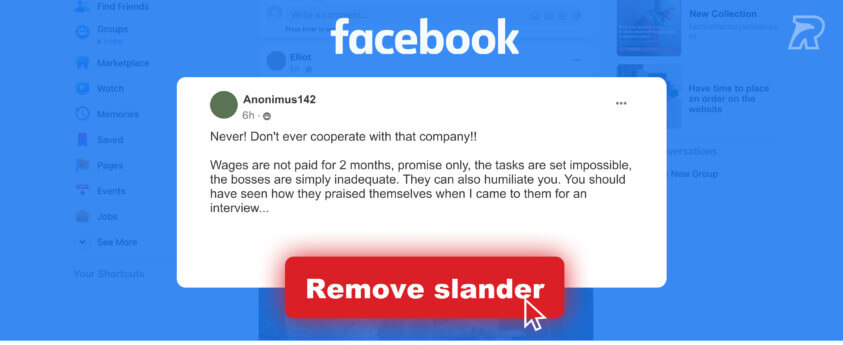Slander on Facebook and the Internet: How Our Experts Can Help You?

What is Slander, and how can it affect your business?
The advent of technology and the rise of social media in the 21st century have changed our lives. There are many benefits of tech, but with the exponential growth of these social media platforms, the pitfalls also arose just as the relationship is directly proportional. Slander on Facebook and defamation on social media platforms like Twitter is becoming popular every single day in the modern technological era. As emotions get high, and they are the driving factor in human lives, sometimes it is all too easy to go and post something mean on the internet to let the frustration out.
Table of contents
Submit a request for the removal a Facebook post
It’s free, confidential, and without obligation
Businesses these days earn a significant amount of their revenues by dealing online; through websites and social media platforms. The brandings, suggestions, recommendations, and reviews are all made through websites and social media platforms in the modern era. Facebook is the most significant source of advertising and branding. Facebook pages also show reviews and recommendations. Hence, the defamation on Facebook can cause a business significant reputational losses. Defamation, in simple words, is a false statement that can harm the reputation of the victim i.e., an individual or company. Whereas, Slander is an untrue, defamatory statement that is spoken orally.
According to brightlocal.com, 84% of users trust online reviews as much as they trust personal recommendations. This fact makes the filtration of Slander on Facebook and Slander on Twitter very important. Additionally, online communities like Yelp and other review sites allow users to share information about their experiences, allowing millions of online users to read these comments and recommendations. The fallback of this sharing of information is that often a user can share this information without going through any regulatory checks and oversights. There are no thoughts of filtering out the truth from these reviews. Hence making the average internet user draw recommendations from whatever is stated in these reviews. Online commentators are more likely to gain attention from the community when they blast or defame an individual or business.
The professed defamatory comments are always presented as facts and not as an opinion. Howbeit, an opinion can allegedly be considered as a factual statement if a person would have interpreted it as such. According to hawleytroxell.com, defamation on Facebook can make your business lose its revenues by more than 30%.
Facebook and Slander: How to solve the problem?
| Terms and Conditions Violations | If you see something negative or defamatory on such platforms, you can easily flag it or report it directly to the website authorities for further action. |
| Stipulated Judgment | A stipulated judgment is an agreement between parties to a lawsuit that spells out the terms of their settlement. Sometimes, it is the best option to resolve the issue of defamation on Facebook or Slander on Twitter. |
| Mediation Strategies | Often, the original reviewer /complainer can redact or remove the review himself. Our mediation experts help our client get to a resolution with the false content poster |
| Negotiations | Another way of removal of such content is through negotiations. These negotiations should only be done through an expert and specialized attorney that have specializations in internet law. |
To help victims out of this dilemma, online reputation management firms are evolving rapidly. Also, there are many laws in action to resolve these issues. Reputation America is a fast-growing online reputation management firm that helps its client against defamation on Facebook and Slander on Twitter other platforms by making use of legal actions.

Terms and Conditions Violations
Commentator websites like Glassdoor and YELP, which provide users a room for their own generated content, perpetually have a set of community rules, guidelines, and policies. These “Terms and Conditions” are supposed to be followed by every user. If you see something negative or defamatory on such platforms, you can easily flag it or report it directly to the website authorities for further action. If the moderator of the website believes that there is some violation of “Terms and Conditions,” they are bound to take the defined action immediately. At Reputationamerica.com, we work directly with attorneys who specialize in such cases. Our attorneys are experienced in getting negative reviews/postings removed through proper channels and by using Terms and conditions and community Guideline violations. If needed, they further escalate the violations to upper management and counsels of the website. Our information removal specialists are proficient in dealing with editors of US web portals.
Stipulated Judgment
Sometimes, settling for a stipulated judgment is the best option to resolve the issue of defamation on Facebook or Slander on Twitter. A stipulated judgment is an agreement between parties to a lawsuit that spells out the terms of their settlement. It becomes a court order once signed by a judge, which makes it easier to enforce than an out-of-court agreement (legalbeagle.com). Oftentimes, some websites have the policies that once content is up on their website, and it never goes back down even if the content creator wants to revise or remove the defamatory/false content. Getting a stipulated judgment is one of the quickest ways to get defamatory content de-indexed from search engines.
Mediation Strategies
Mediation strategies can resolve Slander on Twitter and Facebook. Oftentimes, the original reviewer /complainer can redact or remove the review himself, or the individual/organization can approach the original poster in some way. Our mediation experts help our client get to a resolution with the false content poster. Most of the time, reaching and talking to the poster of defamatory content can help settle things up.
Negotiations
Another way of removal of such content is through negotiations. These negotiations should only be done through an expert and specialized attorney that have specializations in internet law. Our experts are conscious of the mindset of the posters. They analyze the psychological aspects of the defamer and then devise a negotiating plan. As stated by blog search engine Technorati, 94% of bloggers are likely to moderate, pull-back, or delete incorrect information on contacting them. Our attorneys help you in getting off the defamatory content by explaining to the author of the defamatory material that they have made a mistake in their statement. Our expert negotiates with the author and provides them with the correct information and explains to the author the fact that, if they continue to publish, this information can hurt your reputation. Our attorneys have successfully helped clients in getting damaging content removed through negotiations.
Condoning Strategies
We do not just remove information – we solve the problem. Often, the solution to the problem is not the removal of content. In some cases, our negotiation expert concludes that the website or individual can no more access to the malicious or defamatory content for deletion. In such cases, our experts help our clients by de-indexing the content as well as affixing the tag of “Refutation” or “The article is outdated” on the website.
Conclusion
If you or your company are suffering from Slander on Facebook or defamation online that is harming your organization’s reputation or hurting you personally or professionally, you should know that you do have options. Even in the scenarios when removal is not a convenient option, there is still an ample number of strategies that can help you get the negative content hidden, removed, or redacted from the internet.

Still have questions?
It’s free, confidential, and without obligation






May
15.02.2019I respect constructive criticism but when competitors write outright negative reviews, we can do nothing but remove slander from internet. Unfortunately, it's not always possible.
James
15.02.2019In fact, the solution is logical. Moreover, it's right. But it happens so that some unfair organizations drive up a high rating. If it were just shops. But different medical or juridical organisations abuse it.
May
16.02.2019People should bear in mind that relying only on reviews isn't righ :) Moreover, applying to unknown medical or juridical organizations isnt' right (if they have recently appeared) As for slander on companies' facebook pages, it appears there with the same frequency as … People should bear in mind that relying only on reviews isn't righ :) Moreover, applying to unknown medical or juridical organizations isnt' right (if they have recently appeared) As for slander on companies' facebook pages, it appears there with the same frequency as at other sites.
Mr Smith
15.02.2019As far as I know, the owner of the facebook page can remove the reviews. But it's not an option because bad reviews can keep on appearing.
Hanna
16.02.2019But it's really easier to deal with facebook admins. If it doesn't work, you can reply to an author of a review and ask if he or she really thinks so or somebody told him to write this review. The main thing is that it wouldn't be about the quality of your product or service
L Carlos
16.02.2019Author, do you really think that a small company would apply to the court if they don't know what competitor leaves negative reviews about them? Also t costs lots of money and takes years, not even months. We ask our clients to give us feedback at some sites but not al… Author, do you really think that a small company would apply to the court if they don't know what competitor leaves negative reviews about them? Also t costs lots of money and takes years, not even months. We ask our clients to give us feedback at some sites but not all of them would like to spend their time and write something.
Scott
17.02.2019Really? My company provides delivery of farm production. We have some firms-competitors who tried (and is still trying) to spoil our reputation. We struggled for leadership in the market, several years of painful struggle. There were periods when we didn't have clients… Really? My company provides delivery of farm production. We have some firms-competitors who tried (and is still trying) to spoil our reputation. We struggled for leadership in the market, several years of painful struggle. There were periods when we didn't have clients at all. But we coped with it, applied to a digital agency that deal with restoring of reputation.
L Carlos
17.02.2019What do you offer? According to the article, beside the court there're other ways. Negotiations with the site owners? Not all of them are ready to help. Some of them just ignore the request, the others write cliche like "Good afternoon, dear mr. N! There is freedom of … What do you offer? According to the article, beside the court there're other ways. Negotiations with the site owners? Not all of them are ready to help. Some of them just ignore the request, the others write cliche like "Good afternoon, dear mr. N! There is freedom of expression at our site..." Then silence.
Scott
18.02.2019If you explain your clients why give feedback, there will be more people who are eager to leave a positive review. There're especially many clients in social networks who want to give feedback for some encouragement - a discount for example or a gift when purchasing next time
Peppe
19.02.2019A lot of slander has appeared in our facebook and twitter lately. We don't have enough time to deal with ratin restoring, only outsource specialist can help solve this problem.
Rik
8.03.2019Ohh, people complain so often about cyberbullying and lunatics who write some nonsense to them. I always say to them that it's their fault. Why post any personal data to public access, then look for the ways to remove bad comments and apply to such companies?
Dastin
13.03.2019Have you even read the article? A lot of companies promote their services in the internet. If a company has too many negative reviews, its reputation can suffer very much. That’s why such companies exist. Not only common people suffer from internet slander, companies a… Have you even read the article? A lot of companies promote their services in the internet. If a company has too many negative reviews, its reputation can suffer very much. That’s why such companies exist. Not only common people suffer from internet slander, companies are even more vulnerable